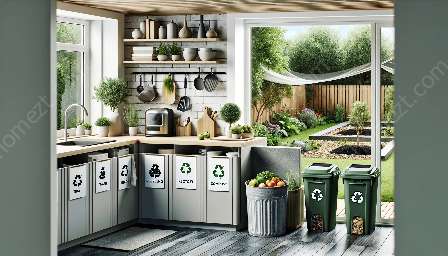As we become increasingly aware of the impact of waste on the environment, many people are looking for ways to reduce, reuse, and recycle at home. Proper waste management techniques are crucial for minimizing our carbon footprint and preserving natural resources. In this guide, we'll explore practical strategies for recycling and reducing waste at home that are compatible with proper waste management and home cleansing techniques.
Why Is Recycling and Reducing Waste Important?
Before delving into the strategies for recycling and reducing waste at home, it's essential to understand the significance of these practices. Waste can have detrimental effects on the environment, including pollution, habitat destruction, and depletion of natural resources. By recycling and reducing waste, individuals can significantly minimize their environmental impact and contribute to a more sustainable future.
Proper Waste Management Techniques
Proper waste management is essential for ensuring that waste is handled and disposed of responsibly. This involves organizing, storing, and disposing of waste in a manner that minimizes environmental harm. Some effective waste management techniques include:
- Segregation of waste: Separating recyclable materials, organic waste, and non-recyclable items makes it easier to dispose of waste in an environmentally friendly manner.
- Composting: Turning organic waste into nutrient-rich compost not only reduces the amount of waste sent to landfills but also provides a natural fertilizer for gardens and plants.
- Recycling: Recycling materials such as paper, plastic, glass, and metal prevents the extraction of raw materials and reduces energy consumption in the manufacturing process.
- Reducing consumption: Minimizing consumption and choosing products with minimal packaging can significantly reduce the amount of waste generated.
- Proper disposal: Ensuring that hazardous materials, electronics, and other specialized waste are disposed of according to local regulations and guidelines.
Home Cleansing Techniques
Keeping your home clean and tidy is an essential aspect of sustainable living. However, it's important to use cleansing techniques that align with eco-friendly practices. Here are some home cleansing techniques that are gentle on the environment:
- Using natural cleaning products: Opt for natural and eco-friendly cleaning products that are free from harsh chemicals and toxins. Ingredients such as vinegar, baking soda, and lemon can be used to create effective cleaning solutions.
- Reducing water consumption: Conserve water by using efficient cleaning methods, such as mopping with minimal water and using a spray bottle for cleaning surfaces.
- Repurposing old items: Instead of discarding old clothing or linens, consider repurposing them as cleaning cloths or rags to minimize waste.
Practical Strategies for Recycling and Reducing Waste at Home
Now that we understand the importance of proper waste management and home cleansing, let's explore practical strategies for recycling and reducing waste at home:
1. Create a Recycling Station
Designate an area in your home for sorting and storing recyclables. Clearly label bins or containers for paper, plastics, glass, and metal to make recycling easy and convenient.
2. Adopt a Zero-Waste Lifestyle
Embrace a zero-waste lifestyle by making conscious decisions to reduce, reuse, and recycle. Avoid single-use plastics, choose reusable alternatives, and seek package-free options when shopping.
3. Compost Organic Waste
Start a compost bin or pile in your backyard to transform food scraps and yard waste into nutrient-rich compost. Use the compost to enrich your garden soil and reduce the need for chemical fertilizers.
4. Upcycle and Repurpose
Get creative with upcycling by transforming old or unused items into new, functional products. Repurpose glass jars as storage containers, turn old clothing into cleaning rags, or use damaged furniture for DIY projects.
5. Educate and Encourage Others
Spread awareness about the importance of recycling and reducing waste within your community. Lead by example and inspire others to adopt eco-friendly practices in their homes and daily routines.
Conclusion
By incorporating proper waste management techniques and home cleansing practices into our daily lives, we can make a positive impact on the environment while enjoying a clean and sustainable home. Recycling and reducing waste at home not only benefit the planet but also contribute to a healthier and more conscious lifestyle for individuals and communities alike.


